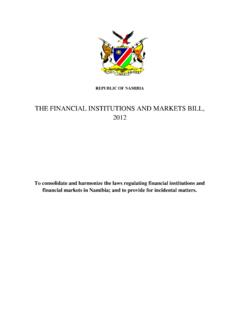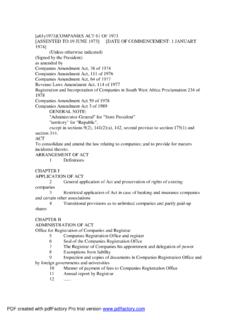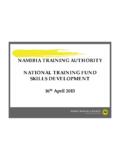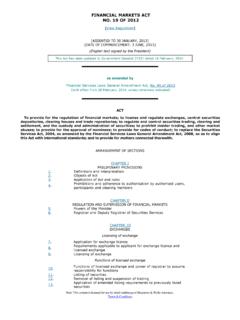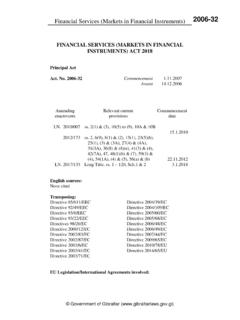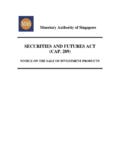Transcription of Namibia Financial Institutions Supervisory …
1 REPUBLIC OF Namibia THE Namibia Financial Institutions Supervisory authority BILL, 2012 To establish an authority to exercise supervision over the compliance with Financial services laws; to provide for the functions and powers of the authority ; and to provide for incidental matters. 1 PART I PRELIMINARY 1 Definitions 3 PART II ESTABLISHMENT 2 Establishment 5 3 Objects 5 4 Powers 6 5 Functions 7 6 Chief executive 7 7 Funds 9 8 General conduct of business 9 9 Co-operation with other agencies and organisations 9 PART III GOVERNANCE 10 Board 10 11 Disqualification for appointment 10 12 Term of office 11 13 Vacation of office 11 14 Meetings of board 12 15 Rules of board 12 16 Committees of board 12 17 Advisory committee 13 18 Appointment of members of advisory committee 13 19 Meetings of advisory committee 14 20 Functions of advisory committee 14 21 Remuneration of board and committees 15 22 Consultation with Minister 15 23 Duties of board 15 24 Duties of chief executive 17 PART IV Financial PROVISIONS 25 Levies 19 26 Fees 20 27 Financial year 20 28 Accounting and auditing 20 2 PART V
2 APPEAL BOARD 29 Appeal Board 21 30 Disqualification for appointment as member 21 31 Term of office 22 32 Vacation of office 22 33 Remuneration 23 34 Administration 23 35 Right of appeal 23 36 Procedure on Appeal 23 37 Decision of Appeal Board 25 38 Decision not suspended 26 39 Rights not limited 26 PART VI GENERAL PROVISIONS RELATING TO NAMFISA 40 Minister s power of direction 26 41 NAMFISA to report Financial Institutions in difficulties 26 42 Delegation of powers and assignment of duties 26 43 Decisions and actions by NAMFISA 27 44 Prohibition on implying connection with NAMFISA 27 45 Liquidation 27 46 Exemption by NAMFISA 28 47 Annual Financial statements and annual report 28 48 Tabling statements and report 29 49 Preservation of secrecy and limitation of liability 29 50 Regulations 29 51 Standards and other measures 29 52 Offences 30 53 Repeal of Act No.
3 3 of 2001 30 54 Short title and commencement 30 3 THE Namibia Financial Institutions Supervisory authority ACT, 2012 PART I PRELIMINARY 1 Definitions In this Act: advisory committee means the advisory committee established by section 17; affiliate has the meaning ascribed thereto by section 1 of the Financial Institutions and markets act ; Appeal Board means the appeal board established by section 29; appellant means a person referred to in subsection 35(1) who lodges an appeal with the Appeal Board; auditor has the meaning ascribed thereto by section 1 of the Financial Institutions and markets act ; banking institution means a banking institution as defined in the Banking Institutions Act, 1998 (Act No. 2 of 1998); board means the board of NAMFISA established pursuant to section 10; building society means a building society as defined in section 1 of the Building Societies Act, 1986 (Act No.)
4 2 of 1986); chief executive means the person appointed as chief executive of NAMFISA pursuant to section 6; claims officer means the person appointed by NAMFISA pursuant to subsection 154(1) of the Financial Institutions and markets act ; committee means a committee of the board established under subsection 16(1); court or courts means any court or courts of Namibia having jurisdiction in the circumstances; Deputy Ombudsman means a deputy ombudsman appointed pursuant to section 5 of the Financial Institutions Ombudsman Act; 4 entity means a corporate body, any other juristic person, a trust, partnership, fund, association, joint venture and any other unincorporated organization, the government of Namibia or any subdivision thereof and the government of a foreign country or any political subdivision thereof; exchange means an exchange within the meaning of Chapter 3 of the Financial Institutions and markets act , and registered under that Chapter; Financial crime has the meaning attributed thereto by section 1 of the Financial Institutions and markets act ; Financial institution means a Financial institution within the meaning of section 1 of the Financial Institutions and markets act , and registered under that Act.
5 Financial intermediary means a Financial intermediary within the meaning of section 1 of the Financial Institutions and markets act , and registered under that Act; Financial services laws has the meaning attributed thereto by section 1 of the Financial Institutions and markets act ; Financial Institutions Ombudsman Act means the Financial Institutions Ombudsman Act, 2012 (Act No. of 2012 ); Financial Institutions and markets act means the Financial Institutions and markets act , 2012 (Act No. of 2012 ) and includes the regulations prescribed under that Act and any standards, rules, guidelines or other subordinate measures issued under that Act; Financial Institutions and markets sector means the sector comprising Financial Institutions and Financial intermediaries regulated and supervised by NAMFISA under the Financial Institutions and markets act ; Financial service has the meaning attributed thereto by section 1 of the Financial Institutions and markets act ; individual means a natural person; Minister means the Minister of finance; NAMFISA means the Namibia Financial Institutions Supervisory authority .
6 Office of the Financial Services Ombudsman means the Office of the Financial Services Ombudsman established under section 2 of the Financial Services Ombudsman Act; Ombudsman means the Ombudsman appointed pursuant to section 5 of the Financial Services Ombudsman Act; 5 participant means a participant within the meaning of Chapter 3 of the Financial Institutions and markets act , and registered under that Chapter; prescribed means prescribed by the Minister in regulations; regulations means regulations prescribed by the Minister under this Act and the Financial Institutions and markets act ; respondent means a person referred to in subsection 35(1) against whom an appeal is lodged with the Appeal Board; self-regulatory organisation has the meaning ascribed thereto by section 1 of the Financial Institutions and markets act ; this Act includes the regulations prescribed under this Act, and any standards, rules, guidelines or other subordinate measures issued under this Act; PART II ESTABLISHMENT 2 Establishment The Namibia Financial Institutions Supervisory authority established under the Namibia Financial Institutions Supervisory authority Act, 2001 (Act No.)
7 3 of 2001), continues to exist as a juristic person as if established under this Act, notwithstanding the repeal of that Act. 3 Objects (1) The objects of NAMFISA are:- (a) to regulate and supervise: (i) Financial Institutions and Financial intermediaries and other persons who are subject to the Financial Institutions and markets act ; (ii) moneylenders as defined in section 1 of the Usury Act, 1968 (Act. No. 73 of 1968); and (b) to foster- (i) the Financial soundness of Financial Institutions and Financial intermediaries; (ii) the stability of the Financial Institutions and markets sector; (iii) the highest standards of conduct of business by Financial Institutions and Financial intermediaries; (iv) the fairness, efficiency and orderliness of the Financial Institutions and 6 markets sector; (v) the protection of consumers of Financial services; (vi) the promotion of public awareness and understanding of NAMFISA, Financial Institutions and Financial intermediaries; and (vii) the reduction and deterrence of Financial crime.
8 (2) In pursuing these objects, NAMFISA must: (a) monitor and assess risks in Financial Institutions and Financial intermediaries and take steps to reduce risks as required in order to protect the public interest; (b) take into account the impact of the costs of regulation and supervision on public access to Financial services; and (c) balance the effectiveness and costs of regulation and supervision with the efficiency of the Financial system. (3) Notwithstanding that the regulation and supervision of Financial Institutions and Financial intermediaries by NAMFISA may reduce the risk that Financial Institutions and Financial intermediaries will fail, regulation and supervision must be carried out having regard to the fact: (a) that boards of directors of Financial Institutions and Financial intermediaries that are corporate bodies and those persons having equivalent powers, duties and responsibilities in connection with Financial Institutions and Financial intermediaries that are unincorporated entities are responsible for the management of those Financial Institutions and Financial intermediaries.
9 (b) that Financial Institutions and Financial intermediaries carry on business in a competitive environment that necessitates the management of risk; and (c) that Financial Institutions and Financial intermediaries can experience Financial difficulties that can lead to their failure. 4 Powers NAMFISA may- (a) employ or otherwise engage persons to render services to NAMFISA or to otherwise assist it; (b) hire, purchase or otherwise acquire moveable or immovable property and let, sell or otherwise dispose of such property; (c) in order to perform the function referred to in subsection 5(1)(c):- (i) establish or participate in the operations of a non-profit company, a partnership, trust or unincorporated joint venture or similar arrangement; and (ii) take any steps conducive to consumer education and the promotion of awareness of the nature and availability of NAMFISA, the Office of the 7 Financial Service Ombudsman and other enforcement measures established by or under this Act or the Financial Institutions and markets act , including arrangements with the Office of the Financial Services Ombudsman, industry associations or organisations, consumer organisations and Financial Institutions and Financial intermediaries and their representatives to assist in transferring knowledge and information to the general public on matters dealt with in this Act and in the Financial Institutions and markets act .
10 (d) insure itself against any loss, damage, risk or liability which it may suffer or incur in good faith; (e) borrow money to the limit approved by the Minister; and (f) do any other thing necessary to perform its duties and carry out its responsibilities under this Act or the Financial Institutions and markets act . 5 Functions (1) The functions of NAMFISA are- (a) to advise the Minister on matters related to Financial Institutions , Financial intermediaries and Financial markets; (b) to monitor risks within the Financial Institutions and markets sector and take such action as may be required to reduce risk as necessary, including by supervising and enforcing compliance with the Financial Institutions and markets act ; (c) to provide, fund, promote or otherwise support consumer education, consumer awareness and consumer confidence regarding consumer rights, Financial services, Financial Institutions and Financial intermediaries, including, but not limited to (i) research, market monitoring, surveillance and reporting.
